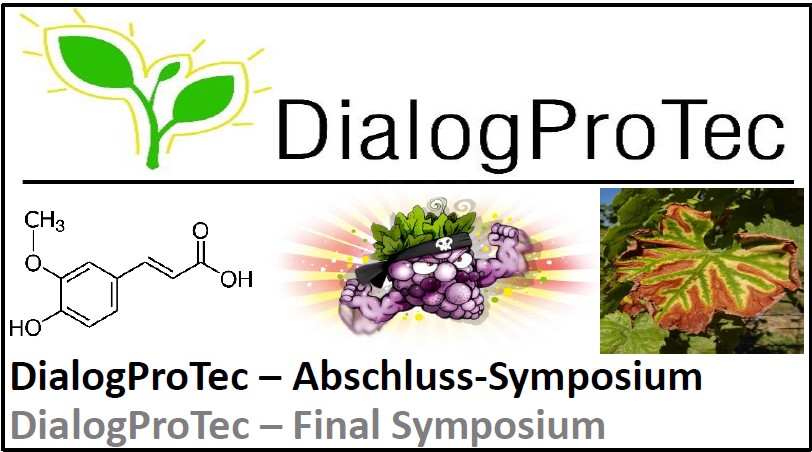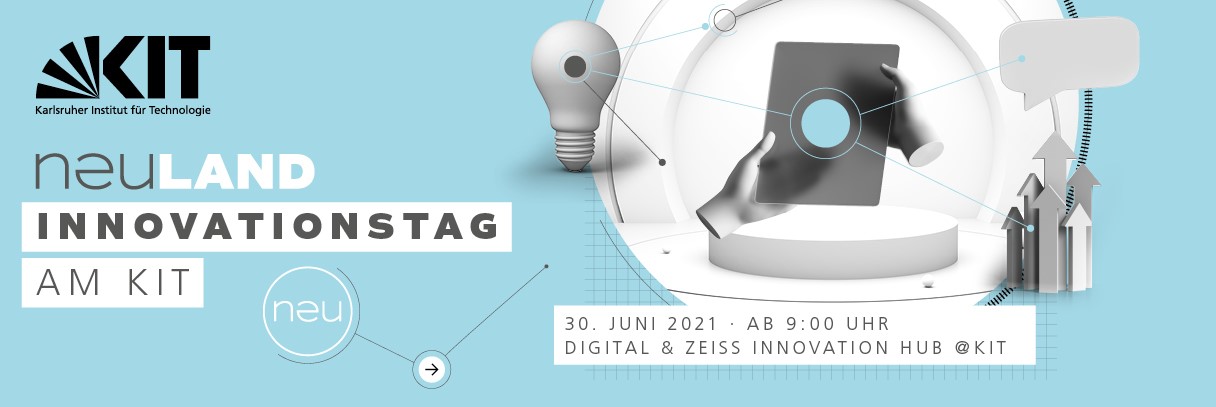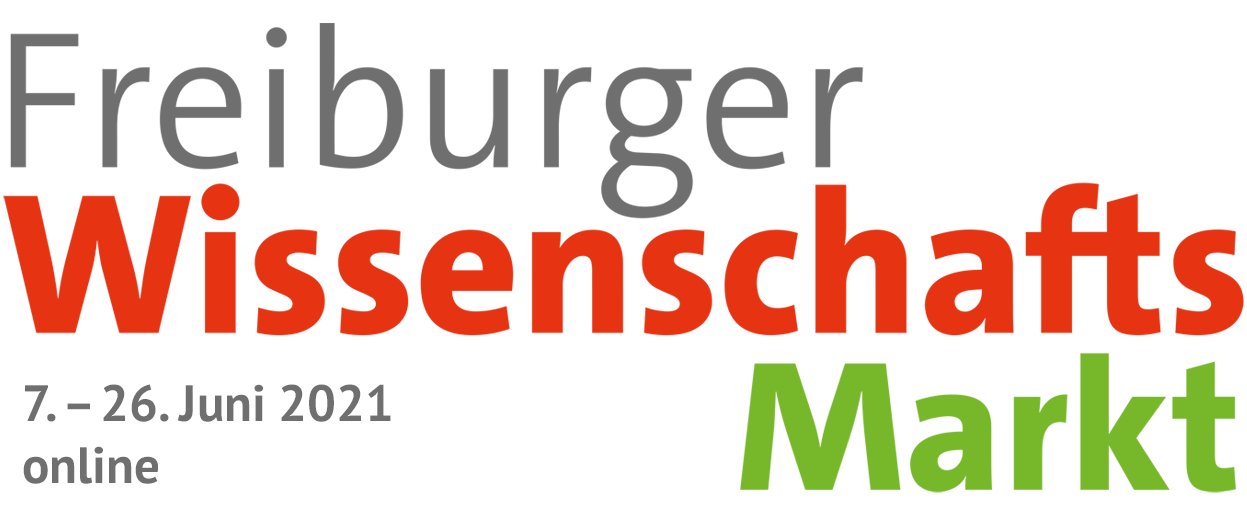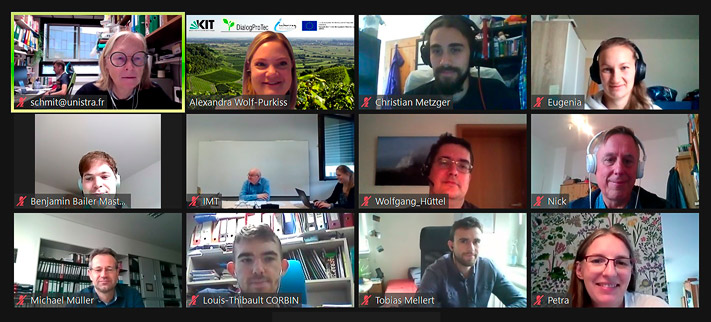Home > News
Healthy communication
In our earler work we elucidated, how climate stress through the accumulation of ferulic acid can trigger the fungi living in the wood, to produce the deathly signal Fusicoccin A, what causes the so-called apoplectic breakdown of the grapevine. Now we could find out, what the fungus does, when it is not alarmed by ferulic acid: it produces 4-Hydroxyphenyl Acetic Acid. This compound mimics the plant hormone auxin and silences, in a sophisticated manner, a part of defence, namely, the enzyme producing the defence compound pterostilbene. This auxin mimic can also trigger growth, such that the fungus promotes the host, and, this way also its own food supply. Is 4-Hydrophenyl Acetic Acid a molecule that leads to a chemical compromise between host and fungus? If so, we might find conditions to keep Esca & Co peaceful, even under climate stress. This cooperative work has now appeared in a high-ranking, international plant journal:
202. Flubacher NS, Baltenweck R, Hugueney P, Fischer J, Thines E, Riemann M, Nick P, Khattab IM (2023) The fungal metabolite 4-hydroxyphenylacetic acid from Neofusicoccum parvum modulates defence responses in grapevine. Plant Cell & Environment 46, 3575-3591
Communication instead of intoxication - Report on project results in BIOSpektrum
In the issue from April 2023 of the biotechnology journal BIOSpektrum (Springer Nature) our report on the project results was published. We show, how very fundamental considerations on evolution and communiation led to nove technology and novel ideas to find chemical signals, used by fungi to manipulate plant immunity, but also signals that drive competitors into suicide. Using bioherbicides from Mint oil as case study, we demonstrate, how fundamental research can drive innovative applications - here in the field of sustainable plant protection.
Nick P (2023) Kommunizieren statt vergiften â neue Strategien fĂŒr den Pflanzenschutz. Biospektrum 29, 213â217
âDialogue instead of a chemical maze â new strategy for sustainable crop protectionâ
Climate change creates stress. This provides an opportunity for pests to exploit plant weaknesses and reproduce. For the infested plant, this can be catastrophic and often fatal. But instead of continuing to protect harvest yields with toxic substances as before, the transnational DialogProTec project is now taking a completely new approach: researchers want to intervene in the communication between plants and pests to keep them healthy. Among other things, they are developing a âvaccination for plantsâ to preventively strengthen the plantsâ immune system.
Read more:
https://www.biooekonomie-bw.de
M4F News: How Climate Stress Sickens Plants
Esca & Co is actually a stress-induced disease. The responsible fungi can live in the wood for many years without causing symptoms. However, when plants are exposed to climate stress, what happens also in our region with increasing frequency, the fungus can sense this and shifts then to a different behaviour - he kills his host, steals the resources from its corpse, makes sex and runs away (it produces spores). The evolutionary meaning is that the fungus cannot expect much from a moribund host and, thus, needs to search for a new place to stay. The outbreak of Esca & Co is, therefore, steered by chemical signals. In a cooperation between the Institute for Biologically Active Compounds (IBWF) in Kaiserslautern we succeeded to clear up two of these signals. Under stress, ferulic acid accumulates in the wood of the grapevine trunk, because this precursor of lignin cannot be any longer converted. The fungus Neofusicoccum parvum has "learnt", to sense ferulic acid as signal for the ensuing crisis of its host and to respond by secretion of Fusicoccin A. Also Fusicoccin A is a signal. It evokes in grapevine programmed cell death, a type of cellular suicide that is actually meant for defence against biotrophic pathogens. These "modern" pathogens can turn the host cell into a kind of zombie that cannot help providing the intruder with sugar. The economically relevant diseases Grapevine Downy and Powdery Mildew are caused by such smart pathogens. The suicide of the zombie cell is efficient, because it tears also these biotrophic pathogens into death. For the defence against Esca & Co this type of defence is completely outplaced, though. Esca fungis live on cell corpses anyway, in technical terms they are necrotrophs. A host cell that kills itself, is for this fungus a convenient victim, therefore. Thus, Fusicoccin A manipulates plant defence in a way that is bad for the plant, but good for the fungus. We succeeded now to elucidate this sophisticated manipulation by chemical signals and publish this in the journal Plant Cell & Environment.
Khattab I, Fischer J, Kazmierczak A, Thines E, Nick P (2022) Hunting the plant surrender signal activating apoplexy in grapevines after Neofusicoccum parvum infection, New Phytologist, Plant Physiol, rejected, resubmitted Plant Cell Environment doi.org/10.1111/pce.14468
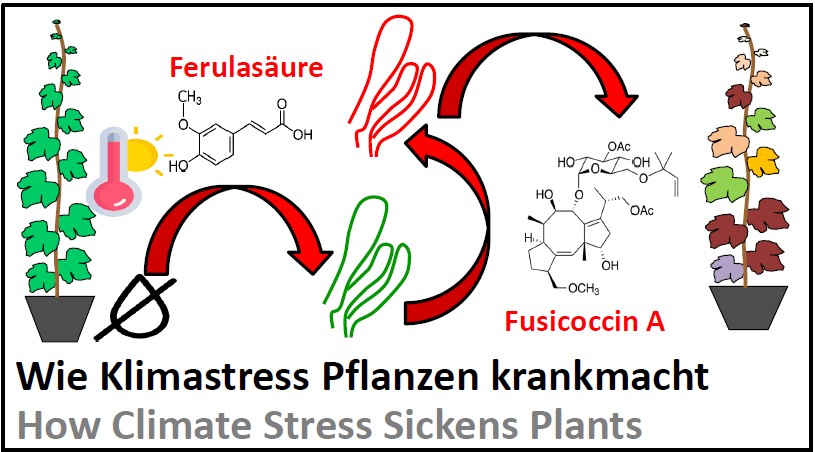
DialogProTec Final Symposium
Thursday, July 7, 2022, we will organise our final symposium for the Interreg Upper Rhine Research Network DialogProTec.
Location: Staatsweingut Blankenhornsberg in the Kaiserstuhl and in virtual form.
>>> Registration <<<
In the scientific part (as hybrid with virtual participation) in the morning, we present how we investigated, in an interdisciplinary cooperation between microsystems technology, natural compound chemistry, stress physiology and molecular cell biology, the chemical dialogue between plants and fungi, but also between plants themselves and succeeded to decipher some of the exchanged signals. In the practical part, we will discuss in exchange with winegrowers, how viticulture in the region can be rendered climate resilient.
7th project meeting in DialogProTec
On 27 October 2021, the 7th virtual project meeting in DialogProTec took place. At the meeting, the project partners presented their latest research results and it was discussed how the project results can be made usable in the best possible way. On the one hand, we are striving for cooperation with industry and are in discussions with potential cooperation partners. On the other hand, our project results are to be made accessible to other scientists and the general public. To this end, we are planning a symposium in spring 2022 at which we will present our findings obtained in DialogProTec.
New project at KIT:
"M4F-RESCUE: Microbes for Future - Resilience to ESCa by Underground Engineering"
M4F-RESCUE receives funding of approximately 500,000 ⏠over 3 years within the framework of the KIT Strategy Fund
The aim of the project is to understand the interaction between the different organisms and to validate a therapeutic approach to treat woody diseases of grapevine. To this end, the plant-associated microbiome in the root zone (rhizosphere) and wood of the grapevine will be mapped and analysed using innovative omics technologies in order to identify microorganisms that positively influence the immune response of the grapevine. To gain insight into plant immunity, the host plant will be inoculated with the Esca-associated fungus (Neofusicoccum parvum) in a series of experiments under controlled conditions and then the microbiome in rhizosphere and wood will be analysed while monitoring host plant immunity. A further aim is to modify the microbiome in the root zone under controlled conditions and in the real situation by adding black soil (terra preta) in such a way that the vine's immune response is enhanced and thus its resilience against Esca is improved. The newly gained knowledge and applications will thus contribute to making viticulture in Baden-WĂŒrttemberg more resilient to climate change.
DialogProTec project meeting
On 27 July 2021, the 6th virtual project meeting took place, where all partners presented their latest project results. In addition, it was discussed how the project results can be made usable for agricultural practice in the best possible way through cooperation with industry.
DialogProTec at the Innovation Day NEULAND at KIT on 30 June 2021
The Innovation Day NEULAND is a meeting platform for all those interested in the topics of technology transfer and business start-ups at KIT. DialogProTec will present itself there at its own booth.
More information and the programme can be found here:
https://kit-neuland.de/de/innovationstag/neuland-der-innovationstag.
The "Plant Days" event at Strasbourg University
On 25, 26 and 27 May 2021, "Plant Days" were held online, from 4 to 6.15 pm. The programme included several scientific lectures by graduates of our masters programmes who are working all over the world on a wide variety of topics. There were also discussions on the master's courses and on professional integration. Furthermore, a video of the international research project DialogProTec was shown to the participants.
DialogProTec at the Freiburg Science Fair 7-26 June 2021
The digital "Freiburg Science Market" (
https://freiburger-wissenschaftsmarkt.de/) will take place from 7-26th June, where, vivid and interactive offers will show how research in the region contributes to the important societal challenges of our time.
At the virtual booth of DialoProTec you can learn more about viticulture in the Upper Rhine region in times of climate change and how we decode the chemical communication between harmful fungi and grapevines in our project and make it usable for plant protection.
On 11 June at 12 pm, there will be a live interview with Prof. Michael MĂŒller from the Institute of Pharmaceutical Sciences at the University of Freiburg and Prof. Peter Nick from the Botanical Institute of the Karlsruhe Institute of Technology on how new innovations in plant protection can be achieved through interdisciplinary research.
A new scientific publication from KIT:
âA modular microfluidic bioreactor to investigate plant cellâcell interactionsâ
In the publication in the scientific journal Protoplasma, scientists from the Botanical Institute and the Institute of Microstructure Technology at KIT have presented their joint results from the DialogProTec project. A microfluidic bioreactor for the cultivation of plant cells was developed that mimics the cell-cell interactions that occur in real plant tissues. In a modular set-up consisting of several microfluidic bioreactors, different cell types can connect through a flow that transports signals or metabolites from module to module. The effect of the signalling substances on the cells can thus be directly observed and the chemical communication between fungal and plant cells can thus be deciphered.
Finkbeiner T, Manz C, Raorane ML, Metzger C, Schmidt-Speicher L, Shen N, Ahrens R, Maisch J, Nick P, Guber AE. A modular microfluidic bioreactor to investigate plant cell-cell interactions. Protoplasma. 2021 May 2. doi: 10.1007/s00709-021-01650-0.
Link to publication:
https://link.springer.com/article/10.1007/s00709-021-01650-0
DialogProTec project meeting
On 23 April 2021, the 5th DialogProTec project meeting took place online. At the meeting, the project partners exchanged information about the progress of the project and presented their current results. In addition, various public relations measures were planned for this year. The dates and further information will be announced here.
Terrestrial University: Every Plant has a Story (to tell)
at the center of art and media (ZKM) in Karlsruhe
Thu, 25.02.2021, 7 pm; free entry
Uriel Orlow, Lili Carr, and Prof. Dr. Peter Nick in conversation
Please join via the link
https://zkm.de/en/event/2021/02/...
The event will be held in English.
If we want to understand the Critical Zone, we should listen to its inhabitants â including those who often do not get a chance to »speak«: plants. What can we learn from them? The fact that plants, unlike humans, animals, insects or bacteria, cannot move around does not mean that they just vegetate. They live, strive, perceive, communicate, and: tell stories.
In this way, plants can also tell us something about our history, as Uriel Orlow's work shows. His installation »Soil Affinities« makes visible the links between agriculturally used plants and colonial history. Here, plants become a compass that points to historical and contemporary (post-)colonial relationships.
As an architect and member of the Feral Atlas Collective, Lili Carr is concerned with the non-designed effects of human-made infrastructures on the natural environment, among other things, and how alternative models of architecture can incorporate them. She has also presented the »Feral Atlas« project at the Driving the Human Festival.
As an expert in molecular cell biology at the KIT Botanical Institute, Prof. Dr. Peter Nick wants to understand how plants manage to adapt so masterfully to their environment in order to survive, and what insights this can give us for a sustainable way of life.
Virtual project meeting
On 26 January 2021, the first DialogProTec project meeting of the year took place. The results of the last three months were presented by the partners and the next joint steps were planned. There are already promising initial results regarding the effect of fungal extracts on plant growth and immunity.
Originally, it was planned that all project partners would meet in turn every 6 months at another project partner's site. Since this is currently not possible, it was decided that the project meetings will take place virtually every 3 months until further notice.
Transnational symposium
on innovations in sustainable crop protection
As part of DialogProTec, an online symposium on the topic of "Innovative ways in sustainable plant protection - science and agriculture in dialogue" took place on 17th December 2020. More than 60 participants from Germany, France and Switzerland attended the bilingual event.
In the scientific presentations, the participants were introduced to how the natural communication between plants and pathogens is decoded, thus opening up new possibilities for more sustainable plant protection. Another topic was how black soil can be used to strengthen the resistance of plants. The concluding discussion focused on the concrete benefits of the newly gained scientific knowledge for agricultural practice in the Upper Rhine region. In addition, the participants had the opportunity to enter into a dialogue with the experts and discuss the possible applications in sustainable plant protection.
Save-the-date:
Symposium "Innovative approaches to sustainable plant
protection - science and agriculture in dialogueâ
Date: 17 December 2020; 1 - 4 pm
Format & topic: scientific presentations and panel discussion on innovations
in crop protection and climate change & biodiversity
Location: online
languages: German & French
More information and the full programme
Virtual project meeting in Strasbourg
On 6 October 2020, the project participants met for a virtual meeting hosted by the University of Strasbourg. During the meeting, results already achieved were discussed and the next steps of cooperation were discussed. The meeting also included the planning of a symposium aimed at the exchange between science and agriculture in the Upper Rhine region, which will take place online in December. Concrete plans were also made for cooperation with a company working on plant fortifiers. This will ensure that the results of DialogProTec will have a direct practical benefit.
Wild vines could help save wine production from climate change
The hot and dry summers are also causing an increasing number of vines to suddenly collapse in the height of their productivity. In a combination of molecular, metabolic, histochemical and cryo-scanning electron microscopic methods, we can now understand how some wild vines resist this. This knowledge can help to arm vines, but also urban trees, against the consequences of climate change. Our work has been published in the high-ranking scientific journal New Phytologist:
http://www.botanik.kit.edu/botzell/downloads/Pub_Khattab_2020.pdf
The deathly command of Korean Mint
KIT has achieved first successes in the search for bioherbicides
The high yields of our industrial agriculture are only possible through the massive use of herbicides. If farmers did not use chemical weed control to keep the weeds away from our crops, they would face crop losses of up to 50%. This is why farmers' organisations are so strongly opposed to the ban on such controversial weed killers as glyphosate. The first results of an EU research project at the Karlsruhe Institute of Technology now offer a way out of this dilemma. The aim is to produce completely toxin-free bio-herbicides.
Click here for the radio interview (in German):
https://doi.org/10.5445/IR/1000119767
Virtual project meeting
Due to the coronavirus situation, the project meeting took place virtually on 18 March 2020. All partners presented their already achieved results and the next steps in the project were agreed upon, also with regard to the current situation.
Poster presentation at the "European Conference of Fungal Genetics"
The project partner IBWF presented a poster on the topic "Fungal Attack: Chemical communication and protection strategies based on the secondary metabolism associated with tree canker" at the "European Conference of Fungal Genetics", which took place from 17-20 February 2020 in Rome.
Kick-off Meeting at the Botanical Institute of the KIT
The project partners in DialogProTec met for a first joint meeting in Karlsruhe on September 3, 2019. At this meeting, the project goals were concretized and the individual work packages and the cooperation between the partners were discussed. The next project meeting will take place in March 2020 at the Institute of Biotechnology and Drug Research (IBWF) in Kaiserslautern.

